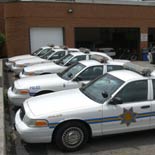 Do not walk through flowing water. Drowning is the number one cause of flood deaths. Currents can be deceptive; six inches of moving water can knock you off your feet. Use a pole or stick to ensure that the ground is still there before you go through an area where the water is not flowing.
Do not walk through flowing water. Drowning is the number one cause of flood deaths. Currents can be deceptive; six inches of moving water can knock you off your feet. Use a pole or stick to ensure that the ground is still there before you go through an area where the water is not flowing.
Do not drive through a flooded area. More people drown in their cars than anywhere else. Don’t drive around road barriers; the road or bridge may be washed out.
Stay away from power lines and electrical wires. The number two flood killer after drowning is electrocution. Electrical current can travel through water. Report downed power lines to Commonwealth Edison at 1-800/334-7661.
Look before you step. After a flood, the ground and floors are covered with debris including broken bottles and nails. Floors and stairs that have been covered with mud can be very slippery.
Be alert for gas leaks. Use a flashlight to inspect for damage. Don’t smoke or use candles, lanterns, or open flames unless you know the gas has been turned off and the area has been ventilated. If you have questions on gas, call 1-888/642-6748 (1-888/NICOR4U).
Carbon monoxide exhaust kills. Use a generator or other gasoline-powered machine outdoors. The same goes for camping stoves. Charcoal fumes are especially deadly- cook with charcoal outdoors.
Clean everything that got wet. Floodwaters have picked up sewage and chemicals from roads, farms, factories, and storage buildings. Spoiled food, flooded cosmetics, and medicine can be health hazards. When in doubt, throw them out.
Take good care of yourself. Recovering from a flood is a big job. It is tough on both the body and the spirit and the effects a disaster has on you and your family may last a long time. Keep your eyes open for signs of anxiety, stress, and fatigue in you and your family.
